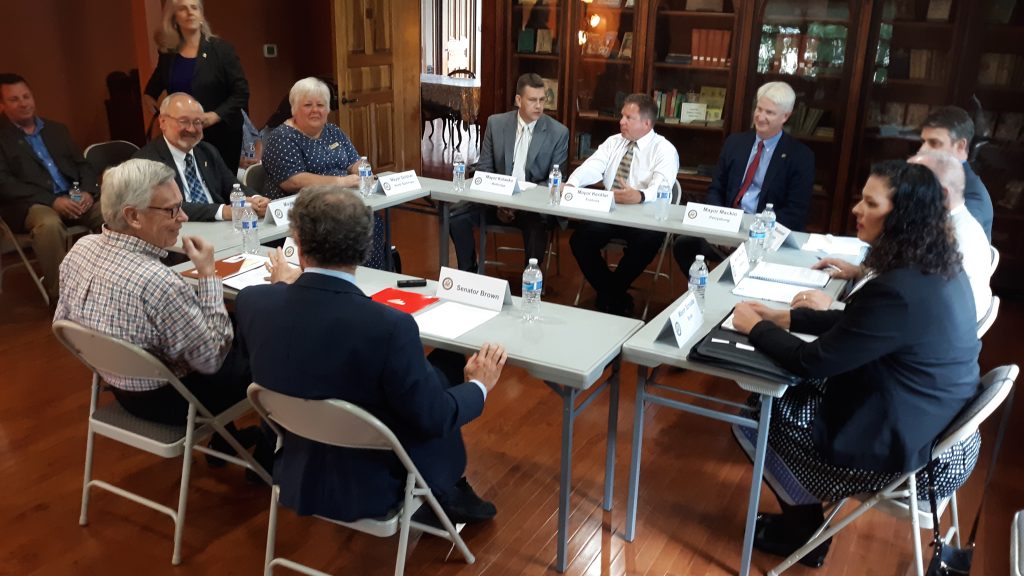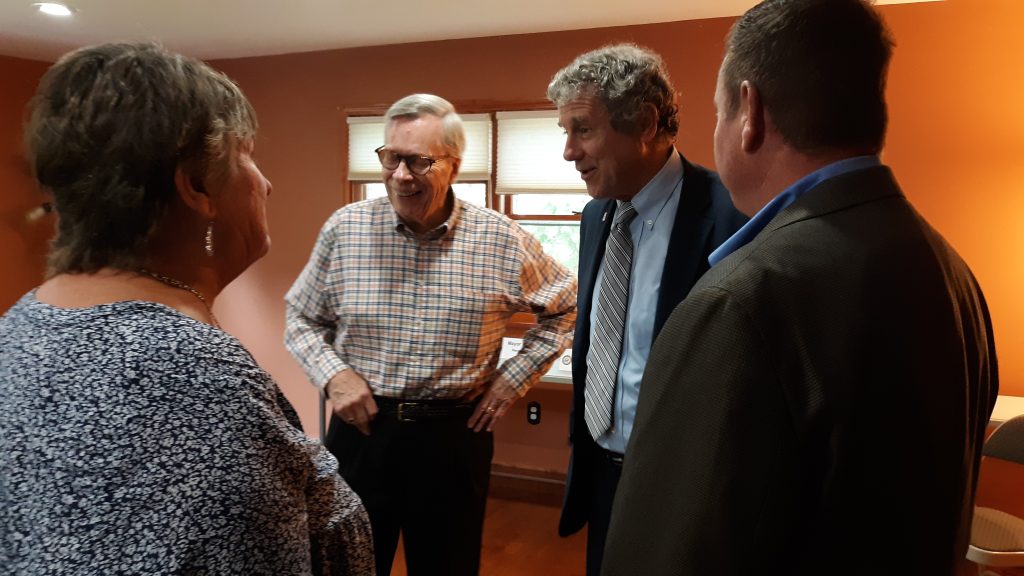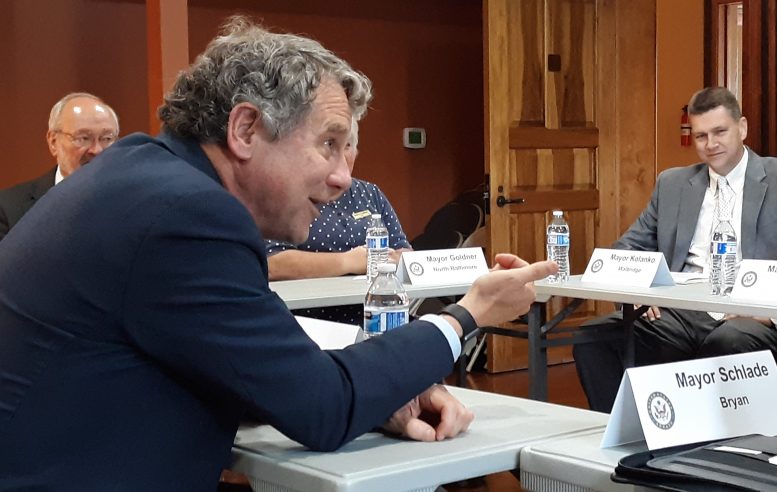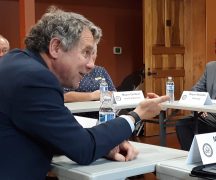By JAN LARSON McLAUGHLIN
BG Independent News
People want to recycle – but finding someone to take the items is nearly impossible. Too much manure from large livestock farms is still making it to Lake Erie. And new housing is almost non-existent – except for in Perrysburg.
Nine mayors from Northwest Ohio sat down with U.S. Sen. Sherrod Brown, D-Ohio, last week in Bowling Green and expressed these concerns and more. Joining in were mayors from Bowling Green, Perrysburg, North Baltimore, Walbridge, Fostoria, Napoleon, Defiance, Bryan and Lima.
Defiance Mayor Mike McCann said he is practically begging builders to construct new homes in his city.
“I defy you to find a house,” in Defiance, the mayor said.
The builders, instead, want to construct in Perrysburg where houses can be sold for much more.
Perrysburg Mayor Tom Mackin acknowledged the growth spurt in his city.
“I’ve got houses growing out of my….” he said, leaving the sentence unfinished.
Bowling Green and North Baltimore have talked about the same issue. North Baltimore Mayor Janet Goldner said the CSX hub west of her village was predicted to bring new people to town.
“The people from CSX all want to live in Perrysburg,” she said.
Many of the village and smaller city leaders desperately want to expand their populations.
“We need to grow our community,” the Defiance mayor said.
Not helping the issue is the difficulty that builders are having finding skilled labor. In some cases, “qualified” labor simply means someone who will return to work after lunch – and pass a drug test, one mayor said.

The mayors talked to Brown about the disservice it was to youth to remove shop classes from schools.
“Everybody in America wants more manufacturing,” Brown agreed. “But nobody wants their kids to work there.”
To help people see the differences in manufacturing today from decades ago, Brown hosts “manufacturing camps” for students throughout the region. This year the camps were held in 34 counties.
The mayors also updated Brown on the difficulties their communities were having with recycling programs.
“Everybody wants to recycle,” Mackin said. But finding buyers is getting increasingly difficult, he said. “Nobody’s taking it.”
While recycling is the right step environmentally, it is now twice as expensive to recycle items as it is to landfill them, the mayor said.
“Now we’re shifting money from other areas” to pay for recycling, Mackin said.
The problem worsened with the tariffs on goods from China, which resulted in China refusing even more glass and other recyclables from the U.S.
The mayors told Brown that some programs claim to be collecting items to recycle, but they end up landfilling them instead.
The health of Lake Erie was also a primary topic of discussion with the senator. The shallowest of the Great Lakes, it reportedly has 2 percent of the total water but 50 percent of the fish in the lakes, Brown said.
Lima Mayor Dave Berger talked about the run-off from fields getting into the Maumee River, then traveling to Lake Erie and resulting in harmful algal blooms.
Agricultural runoff is responsible for 85 percent of the algae problems, Berger said.
“That, frankly, needs to be addressed,” he said.
The average cow produces anywhere from 40 to 120 pounds of manure a day, the mayor said. And many Concentrated Animal Feeding Operations that have fewer than 700 animals have no regulation for how that manure is dispersed on fields, he said. The Clean Water Act does not address the issue, he added.
The larger CAFOs are not regulated enough, and the smaller operations aren’t regulated at all, the mayors told Brown.
On another agricultural issue, the mayors talked about the plight of Ohio farmers, many who were unable to plant due to flooded fields this past spring. Brown said next to North Dakota, Ohio farmers had most farm fields that went unplanted. Fortunately, Ohio has the highest percentage of farmers with crop insurance, the senator said.
Brown expressed concern for other businesses connected to agriculture.
“In some sense, we take better care of the farmers than the rest of them,” he said.
The issue is being exacerbated, the senator said, by tariffs imposed by President Donald Trump, and by waivers being granted to oil refineries so they don’t need to use as much ethanol, which is made using corn.
“I’ve made an appeal to the president to change that,” Brown said.

The mayors also talked with Brown about:
- Infrastructure. Brown said Trump has been talking about big money going into infrastructure, but, “We haven’t seen any real effort yet.”
- Gun violence. The senator talked about the effectiveness of background checks and the assault weapons ban that existed from 1994 to 2004. He talked about the Dayton mass shooter firing off 41 bullets in 31 seconds.
- EPA mandates. Fostoria Mayor Eric Keckler talked about unfunded mandates on municipal sewer systems. Mackin said Perrysburg may be looking at sewer and water rates hikes. “It’s very painful and can cause a huge burden on taxpayers,” Mackin said.
- Broadband connectivity. The Defiance mayor said his city can’t conduct some water testing because of the lack of broadband. “We need this connectivity desperately,” he said.
- Railroads. The mayors of Walbridge, North Baltimore and Fostoria also spoke about being in “train towns.” CSX isn’t always a good neighbor, with an increase in longer and overloaded trains, Walbridge Mayor Ed Kolanko said.
- Trash. Keckler talked about the landfill outside Fostoria, in Seneca County, which is “bringing in an enormous amount of trash from the East Coast.” Like all landfills, it is protected by interstate commerce laws.
- Loss of state funding. The Perrysburg mayor talked about the state’s “chipping away at our pockets.” Bowling Green Mayor Dick Edwards agreed the funding cuts are hurting communities. “It’s the cumulative effect,” Edwards said.
- Cable franchises. Edwards shared Bowling Green’s concerns about having no input into cable franchises in the city. “It’s been very frustrating dealing with the FCC,” he said. The mayor thanked the senator for his ongoing support of public television.


